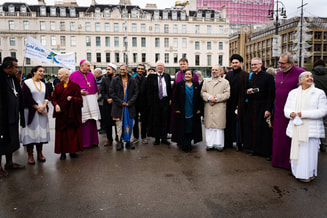
The Parliament of 1993 had been called to commemorate the original Parliament of World Religions which had taken place in Chicago in 1893 as part of the Chicago’s World Fair. It was the first major coming together of Hindus, Buddhists, Jains, Jews, Protestants, Catholics, Unitarians, and adherents of the Shinto and Zoroastrian traditions in modern history. At the opening session the chairman declared “
“We are met together today as men, children of one God. We are not here as Baptists and Buddhists, Catholics and Confucians, Parsees and Presbyterians, Methodists and Moslems; we are here as members of a Parliament of Religions, over which flies no sectarian flag.”
The star of the show was Swami Vivekananda who got a standing ovation after his presentation on Hinduism. For the first time people of the west were introduced to the message of religions such as Buddhism and Hinduism and responded well to Vivekananda’s call for an end to “sectarianism, bigotry, and its horrible descendant, fanaticism…. and all uncharitable feelings between persons wending their way to the same goal”.
One hundred years later there was a reconvening of the Parliament in Chicago at which the Global Ethic document was presented and accepted after several years of consultation. I was involved in interfaith relations at that time and remember well the discussions beforehand of the document. Our Glasgow interfaith group spent many a meeting looking at it and discussing it. I wasn’t present at the Parliament but was able to go to an offshoot of it in Bangalore in India – chosen because India was much more attractive than Chicago. It was an interesting event, and the various workshops and presentations must have taken a lot of organising, but my memory is that it was a bit of a jamboree with nuggets of wisdom and insight among some rather odd events and organisations. It did rather put me off such events. However, the Global Ethic was certainly to the forefront and for some time afterwards was promoted by interfaith groups, academics, and others as an important vision for faiths working together for a renewed future. We had a major interfaith conference here in Glasgow and brought Hans Kung’s exhibition on religions’ response to the Global ethic to Scotland. The ethic was based on two foundational principles – the Golden Rule, common to all faiths and spiritual traditions and the need to treat people humanely. These were elaborated in a commitment to a culture of non-violence and respect for life; a commitment to a culture of solidarity and a just economic order; a commitment to a culture of tolerance and a life of truthfulness and a commitment to a culture of equal rights and partnership between men and women.
It’s good that the Global Ethic was resurrected at this year’s Parliament but now to be considered side by side with the Earth Charter, the second landmark statement on global ethics and a vital one for our contemporary world. Both documents are said to “offer a rigorous ethical critique of the current world crisis and its root causes – as well as a vision of hope for the future. Both prioritize human dignity, equality, and reciprocity, as well as care for the Earth”. During the Parliament leaders from Muslim, Hindu, Jewish, Sikh, Jain, Buddhist and Christian communities held a climate repentance ceremony and read 10 spiritual practices for addressing climate change. Among them: "We must care for each other and the planet, deepening our efforts to bring about a change of heart among members of our traditions in the way we relate to the Earth and to other people.
This is not the first such statement from religious leaders. In 2021 ahead of the United Nations climate change conference in Glasgow, COP26, nearly 40 heads of major religions, including Pope Francis, issued an unprecedented call for governments to cut greenhouse gas emissions. And during that Cop meeting the religious leaders of Scotland publicly declared their commitment to working together for the future of the earth. A lot of talk which needs action. Perhaps those who attended this year’s Parliament of World Religions could be a catalyst for a renewed study of both the Global Ethic and the Earth Chapter and the drawing up of a plan of action to be carried out by faith communities and interfaith groups. This could be the Parliament’s legacy.


 RSS Feed
RSS Feed
